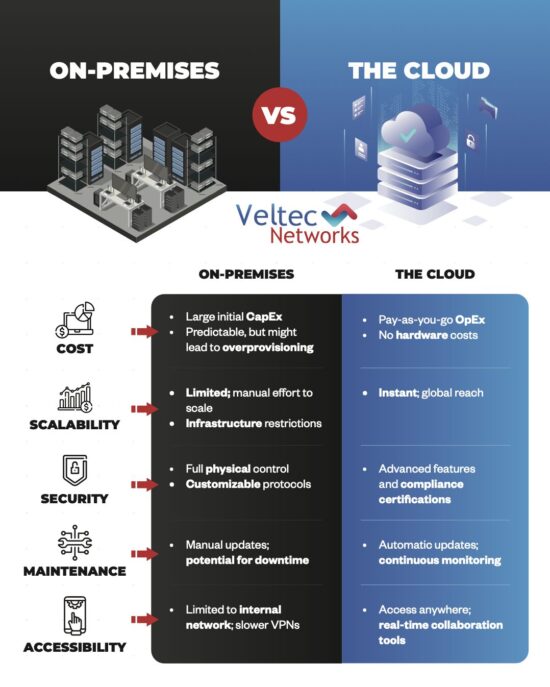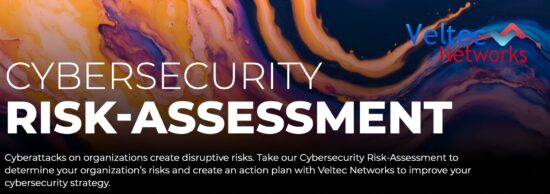Healthcare Cybersecurity Services by Veltec Networks
Healthcare facilities have sensitive data that needs to stay secure from hacking and malware. Has your organization implemented the right cybersecurity?
How up-to-date are you on the cybersecurity threats to the U.S. healthcare sector? Did you know that the U.S. healthcare and medical sector had 374 data breaches in 2017? These breaches total to 23% of the total 1,579 data breaches that occurred in 2017. And most of these data breaches were caused by inside actors driven by:
- 48% — financial gain
- 31% — curiosity
- 10% — convenience
In a 2018 analysis by Thales Security, 77% of U.S. healthcare organizations have reported a data breach, and 48% have had a data breach in the last year.
How Can Healthcare Organizations Prevent Data Breaches?
If you’re a healthcare executive, you may be wondering how to prevent cyber attacks. With the increased knowledge of the value of healthcare data, the industry has been plagued by hackers. Without the proper protections in place, you may risk your reputation and damage your patients’ trust.
Why is Healthcare Data Valuable?
Unlike credit cards, which can be canceled or turned off, healthcare information can be used by a malicious actor for years without anyone finding out. The information can be used to obtain prescription drugs, medical services, medical devices, and for identity theft. Since it often takes a while for medical invoices to be paid, criminals have a longer time to use data as a cover.
What is the Best Cyber Security Strategy for Healthcare Organizations?
There are several strategies to improve healthcare organizations’ cybersecurity. No matter which approach you take, these best practices will help keep your data safe.
1. Perform Regular Audits
Audits can help you discover any potential problems and/or inefficiencies in your data systems. Audits can evaluate your emergency response strategy or creating one. It’s critical to hire at least one dedicated employee to take care of your cybersecurity applications. Know that consolidation can be both a curse and a blessing. The larger your organization is, the easier it is to implement vendor policies to protect your data. However, consolidation also may increase points of vulnerability that can be attacked. If you find problems in your computer network that can be exploited, don’t wait to deal with them. And don’t forget to allocate the resources necessary to address cybersecurity risks.
2. Evaluate Third-Party Companies
Third-party businesses are frequently the weakest point in an organization’s defense against cyber attacks. It’s ill-advised to work with any third-party without a background investigation. Make sure you ask all the parties you work with about their cybersecurity systems and that of their partners. This evaluation will help you protect your own business, and put you in control of your data.
When evaluating third parties, discover if they pose any risk to your healthcare systems. Have they ever experienced a data breach? How did it happen, and how did they respond to it? Were their employees investigated afterwards? Ask about any security measures they have implemented to prevent data breaches in the future.
Evaluating third parties is time-consuming and expensive, but it is essential for your healthcare organization’s cybersecurity. You never want to end up working with unreliable or fraudulent companies.
Additionally, evaluate your reimbursement process from insurance companies periodically to ensure they pay the right entity. Payments can be misdirected due to fraud, which results in two losses, the vendor needing payment, and the loss of the money sent to the wrong person.
3. Have a Backup System
It’s critical to have a good backup system to recover after a breach or other loss of data. A backup system helps to minimize downtime and disruptions. Your backup system should be available to recover data in case of a cyber-attack or corrupted data. The backup system needs to include policies regarding how and when data is accessed to maintain it in good condition.
4. Educate Your Staff about Healthcare Cyber Security
Without training your employees about cyber attacks can expose your organization to an attack. Hackers don’t need to use sophisticated cyberattacks, they only need to find someone to let them in. Phishing is successful because employees don’t know what to look for. Another area that can become a vulnerability is wire transfer approval. Emphasize that the procedures are what protects your company against cyber threats.
Is Cyber Security a Priority?
Whenever you adopt new technology, healthcare cybersecurity must be a priority. Many cyberattacks are preventable. Maintaining a working cybersecurity strategy along with best practices will help deter malicious actors and improve your organization’s capability to protect against potential security incidents.






